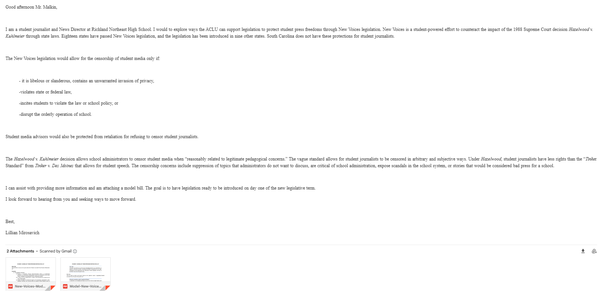

As a journalist, we have industry standards that should be upheld to produce work that follows legal and ethical guidelines. CavPlex Convergence Media students are taught these standards as part of the course curriculum during their classes. Students are also taught news literacy during class so that we can determine the credibility of news sources and information. Critical thinking, fact checking, and original sources are necessary to produce high-quality news content. When researching a topic for a story, I make it a practice to find the original study or research when it is cited.
South Carolina does not have a New Voices law to protect student press freedoms with a state law. In 1988, the Hazelwood v. Kuhlmeier Supreme Court decision reduced student press freedom. During the fall of 2024, I contacted the ALCU of South Carolina and Beth Bernstein, my South Carolina State Representative, about collaborating to write legislation in South Carolina to protect student journalists. I met with Representative Bernstein about working to pass New Voices legislation on September 25, 2024.
At the start of my senior year, I realized that there was no Code of Ethics for our program and wanted to create an official policy. I drew inspiration from other journalistic sources and Grace Hamilton, the 2023 National Journalist of the Year.
The style of journalism that I really enjoy and excel in are more formal stories, which allow me to take a lot of complicated information and issues and synthesize them. For these complex topics, I break the issue down to root causes and explain them in an easy, digestible way for the viewer. For the C-SPAN StudentCam Competition in 2024, the prompt was titled “Look Forward while Considering the Past.” I created a video on gerrymandering to answer the prompt, “Over the next twenty years, what is the most important change that you would like to see in America?” Over my time as a journalist, I noticed that laws oftentimes do not reflect the views and opinions of the majority of the public. I researched the causes of this disconnect and investigated the types of gerrymandering, how it has impacted South Carolina, and ways to resolve the issue.
I have reported on many topics that have a direct impact on my school district and public education in South Carolina. Two examples include broadcast stories titled “State Superintendent of Education Election” and “Richland 2 Superintendent.” Both of these stories were reported during a time when changes in leadership could have a profound impact on the direction of our district and public education.
When book bans were proposed in South Carolina in 2023, I wanted to take the opportunity to understand what the current policy of my district stated. I interviewed my school’s media specialist to explain the process of selecting books for the school library. These stories introduced students to topics they may not have been aware were happening, making knowledge of the potential impacts more accessible. I encourage my staff members to cover subject matters impacting the school and local community.